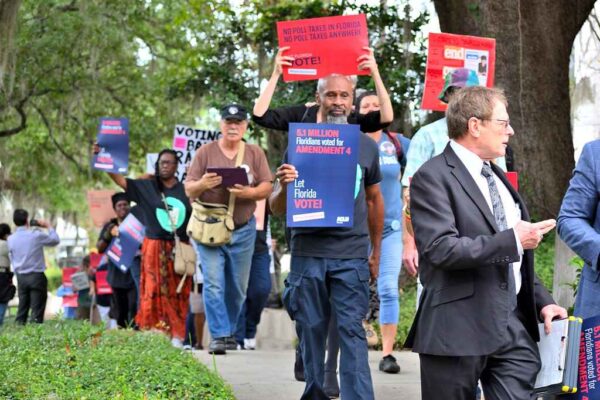Voting and Civil Rights Organizations File Suit Over Florida’s Flawed Voter Registration Form
Omissions put thousands of Floridians with past criminal convictions at risk of criminal prosecution
TALLAHASSEE, Fla. — The League of Women Voters of Florida and the Florida State Conference of the NAACP filed suit in federal court today against Florida’s secretary of state, charging that the state’s violates the National Voter Registration Act of 1993 (NVRA). The civil rights organizations allege that the form’s lack of information about the voter eligibility requirements for Floridians with past convictions creates confusion, impedes the organizations’ voter registration activities, and puts people in danger of criminal penalties.
The American Civil Liberties Union, ACLU of Florida, Brennan Center for Justice at NYU Law, Legal Defense Fund, and O’Melveny & Myers represent the League of Women Voters of Florida and the Florida NAACP in the suit.
“Our state has a moral and legal duty to inform prospective voters of their eligibility to register,” said Cecile M. Scoon, president of the League of Women Voters of Florida. “It is imperative that Floridians with past felony convictions understand whether they are eligible to register to vote, particularly when the state is targeting those who misunderstand this with criminal prosecution. The state must fulfill the requirements of the National Voter Registration Act and protect its residents.”
“Clear and accessible information is a key pillar of voting rights,” said Celina Stewart, chief counsel and senior director of advocacy and litigation at the League of Women Voters of the United States. “The National Voter Registration Act requires states not only to provide a way for citizens to register to vote but also to inform voters of the rules and procedures to do so.”
“Florida has a fundamental obligation to ensure that all citizens can fully understand, access, and exercise their voting rights,” said Adora Obi Nweze, president of the Florida State Conference of the NAACP. “Yet, the state has fallen short of fulfilling its obligations because it requires returning citizens to fill out a flawed voter registration form and without any clear guidance. This failure has generated confusion and fear for returning citizens and groups like the Florida State Conference of the NAACP, which assist returning citizens through its voter registration activities, amidst the state's ongoing criminal investigations and prosecutions. We urge the state to remedy our harms by meeting its NVRA obligations.”
The National Voter Registration Act requires states to “inform applicants ... of voter eligibility requirements” and for federal and state mail-in registration forms used for federal elections to specify “each eligibility requirement.” Florida’s voter registration application, as the complaint notes, doesn’t include any guidance for would-be voters who are trying to determine if they are eligible to vote under Amendment 4, a state constitutional amendment approved in 2018 that restored voting rights to most people with past convictions.
The form does not indicate that individuals on probation or parole are ineligible, nor does it say that paying outstanding court fines and fees is a precondition to having voting rights restored (as per Senate Bill 7066 passed in 2019). The form also does not say that those convicted of murder or a felony sex offense are not eligible to vote unless they have received clemency. And it does not contain any information about eligibility requirements for people with convictions from another state.
Every Floridian, including those who are ineligible to vote, must be properly informed of the voting eligibility requirements. The absence of this information on the form can lead eligible would-be voters to refrain from registering because they think they’re ineligible. It has already led to criminal investigation and prosecution for ineligible voters who genuinely believed they are eligible when they are not. And it is deterring voter registration efforts. Volunteers with the League of Women Voters of Florida and Florida NAACP fear inadvertently registering an ineligible voter and putting them at risk of criminal penalties.
Dozens of people with past convictions, most of whom are Black, have been arrested and criminally charged for allegedly registering and voting while ineligible. Several were advised to register or were told they could vote by a government official, and most received an official voter information card in the mail – further leading them to believe they were eligible.
In January, the plaintiffs and their counsel sent a letter to the state to alert officials to the form’s violation of the National Voter Registration Act and asking for a remedy within 90 days. The state did not address the application’s faults. The plaintiffs filed the lawsuit in U.S. District Court for the Northern District of Florida.
The organizations representing the plaintiffs made the following statements:
“In failing to provide adequate voter guidance, the state is presenting an impossible choice to returning citizens: stay disenfranchised or risk criminal prosecution,” said Daniel Tilley, legal director of the ACLU of Florida. “We’ve already seen the devastating human impact of these anti-voter schemes and the confusion it has created, especially for Black and brown communities. The state must honor the will of Florida voters and create a streamlined process for full restoration of voting eligibility for those with past felony convictions.”
“Floridians have a right to know whether they are eligible to vote, and the state has an obligation to determine that. They should not be punished for the state’s inability to fix its broken system,” said Julie Ebenstein, senior staff attorney with the ACLU’s Voting Rights Project.
“The state of Florida has turned registration and voting for people with past convictions into a minefield. We’re urging the court to clear one of the mines,” said Eliza Sweren-Becker, counsel in the Brennan Center’s voting rights program. “The state’s voter registration application is ensnaring people with past convictions back into the criminal system and leading to the de facto disenfranchisement of untold numbers of eligible Floridians.”
“Florida’s failure to comply with the NVRA has harmful consequences for returning citizens, who are disproportionately Black people,” said Leah Aden, deputy director of litigation at the Legal Defense Fund (LDF). “Returning citizens and the non-partisan organizations working with them struggle to accurately complete Florida’s voter registration form because it lacks the necessary specificity of eligibility requirements for people with prior criminal convictions. The harms are compounded by Florida’s maze of voter eligibility rules and Florida’s targeted prosecutions of returning citizens for what appear to be honest mistakes in answering the flawed voter registration form. We seek a remedy so that all eligible Floridians can access our democracy fairly and fully.”
“It is vital that the state of Florida provides all Floridians—especially those with past convictions—with clear and comprehensive information about voter eligibility. O’Melveny is proud to work alongside the Brennan Center for Justice, ACLU, ACLU of Florida, and NAACP Legal Defense Fund in seeking to ensure that every eligible Florida voter can fully and freely participate in the democratic process,” said O’Melveny partner Andrew Frackman.
Complaint: /documents/complaint-league-of-women-voters-of-florida-v-byrd





